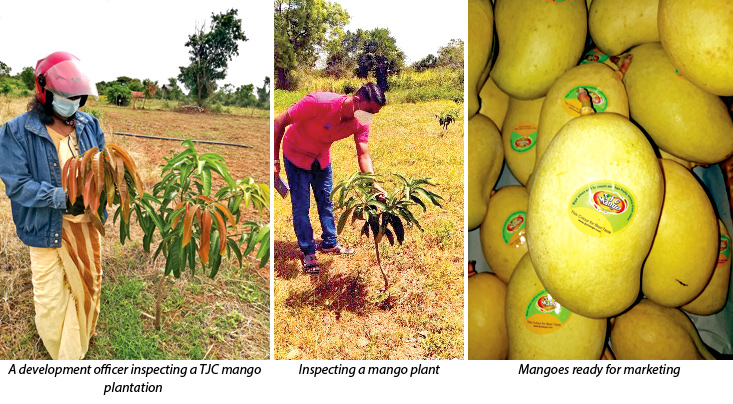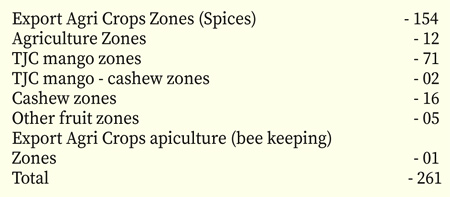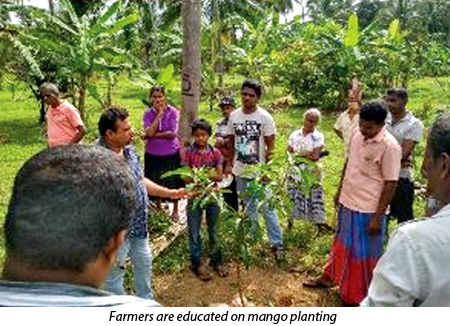
Mango is considered a tropical fruit believed to have originated in Asia. China and India are the world’s two largest mango producers. Sri Lanka, Philippines, Thailand, Pakistan, Brazil, Nigeria and Mexico are famous for commercial mango cultivation.
 According to the Food and Agriculture Organization (FAO), the world mango production is around 60 million metric tons per annum whereas there are nearly 1,000 verities of mangoes are cultivated worldwide. Ripe and raw mangoes are used for human consumption as jams, juices, pickles honey, sauces and chutneys all over the world.
According to the Food and Agriculture Organization (FAO), the world mango production is around 60 million metric tons per annum whereas there are nearly 1,000 verities of mangoes are cultivated worldwide. Ripe and raw mangoes are used for human consumption as jams, juices, pickles honey, sauces and chutneys all over the world.
Serious quantitative post harvest losses and quality deteriorations occur during all stages of the horticulture supply chain mainly involve mangoes. Many surveys and studies have revealed that the post harvest loss in fruits and vegetables range from 30 – 10 percent which amounts around 0.39 million metric tons per annum. The value of this loss has been estimated as Rs 18,000 million or more. The value of fruits mainly including mangoes and banana which could be saved annually by reducing post harvest losses occurred during the transportation is around Rs 5,800 million according to the National Institute of post-Harvest management.
There has been a growing demand for mangoes in the world market. Its value added products cause the prices of mangoes go up speedily. Inspired by the Vistas of Prosperity manifesto of President Gotabaya Rajapaksa, it has been proposed to establish export crops villages including mangoes growing villages.
Cultivation zones
The Government has launched a TJC mango cultivation zones island wide. When referring to Tom EJC or the TJC mango variety, it is now a world famous fruit originated from Sri Lanka as a result of long research and tests conducted by Deshabandu Tom Ellawala and Juwan Carlose a Horticulturist who was a Philippine national working in Sri Lanka under an ADB Agricultural Development Project in the dry zone.
The range of research tests and studies were conducted at the Tom Ellawala’s Rajarata farm at Dambewatana, Galkiriyagama in Anuradhapura district comes under Ellawala Horticulture limited.
The name Tom EJC or the TJC denominated as a tribute to the Tom Ellawala and Juwan Carlose who pioneered in producing the superior mango variety now dominating the market. In Sri Lanka, according to the information sources of the State Ministry of Minor Crops including Export promotion, nearly 30,000 acres have been cultivated with mango such as Karatthacolomban, Vilad, Vella Colomban, Rata Amba, Pol Amba, PapolAmba, Gira Amba, Petti Amba and Mee Amba and now the TJC variety is going to be in the forefront.
Invention
 A project to provide technical assistance to improve the production and commercialisation of fruit value chains in Sri Lanka has been launched by food and Agriculture Organization of the United Nations (FAO) and the agriculture ministry with China extending the financial support. The project is valued at Suu $ 1.1 million initially.
A project to provide technical assistance to improve the production and commercialisation of fruit value chains in Sri Lanka has been launched by food and Agriculture Organization of the United Nations (FAO) and the agriculture ministry with China extending the financial support. The project is valued at Suu $ 1.1 million initially.
The UN’s food and Agriculture organization says that there is a rich diversity of fruits with a range of 100 edible fruit crops mainly the mangoes, and there is a significant potential for launching a fruits based profitable industry, earning foreign exchange. The particular project is scheduled to be implemented in Anuradhapura implemented in Anuradhapura, Kilinochchi, Gampaha, Kaluthara, Monaragala districts mainly focusing on mangoes, banana and pineapple.
The Ellawala Horticulture bagged three awards at Mahaweli Entrepreneurship Presidential awards recently while in 2018 it emerged as the gold award winning entrepreneur of Anuradhapura district. The Ellawala Horticulture’s Director Suresh Ellawala told the Sunday Observer that the Tom EJC mango variety invented by Tom Ellawala the Chairman of Ellawala Horticulture has proved that invention was the short cut to conquer the world by securing a high demand in the local as well as international market. He said that his institute has been very closely associating with the government agriculture sector in popularising the TJC variety island wide.
 The then Plantation Industries and the Export Agriculture Ministry took the initiative to establish TJC mango export zone in several districts as a pilot project. Then in terms of the Vistas of Prosperity and Splendour policy of President Gotabaya Rajapaksa, the State Ministry of Development of Minor Corps including sugar cane, maize, cashew, pepper, cinnamon cloves, betal related industries and Export Promotion, the establishment of agri zones has been entrusted with the task of developing and promoting TJC mango zones and TJC mango - cashew zones among other export agri zones at district level.
The then Plantation Industries and the Export Agriculture Ministry took the initiative to establish TJC mango export zone in several districts as a pilot project. Then in terms of the Vistas of Prosperity and Splendour policy of President Gotabaya Rajapaksa, the State Ministry of Development of Minor Corps including sugar cane, maize, cashew, pepper, cinnamon cloves, betal related industries and Export Promotion, the establishment of agri zones has been entrusted with the task of developing and promoting TJC mango zones and TJC mango - cashew zones among other export agri zones at district level.
A spokesman for the State Ministry told the Sunday observer that the President’s vistas of prosperity and splendour policy statement enabled the establishment of export zones under the centered economy, thus increasing the current contribution of the national agriculture sector from 2 percent to GPD to 6 percent by 2025 along with the advancing agri- entrepreneurship development. According the state ministry has introduced the National Program for Establishment of Export Agriculture Zones islandwide.
Value chain
“This identifies the type of export agriculture crops including TJC mangoes holding the potential to reap high economic benefits, taking in to account the environmental, social and agricultural factors specific to the area and recommended. The value chain of production is developed by carrying out activities such as cultivation, product processing, value addition, sale and export in an established agricultural zone. The program aims to mobilise the rural masses and target the national and international market” the state ministry spokesman said. He said that it has been planned to increase the export earnings from export agriculture sector from present Rs. 102 billion to Rs 250 billion.
In the past year, 261 export zones have been identified for export crops including TJC mango, cinnamon, peper, vanilla, cashew, betel and allied crops centered on Anuradhapura, Matale, Moneragala, Ratnapura, Kurunegala, Kegalle, Galle, Matara, Hambantota, Trincomalee, Badulla, Polonnaruwa, Ampara and Kandy districts.
As per TJC mango zones in 2021 stood at 71, while number of mango plants distributed is 765,168. The annual income as estimated per farmer taking to TJC mango cultivation is Rs 250,000 or more than that.
“The TJC mango is a unique variety of mango with a unique flavour to Sri Lanka with international brand,” said Anuradhapura District Planning Director Sugath Nayanananda, who is coordinating the Anuradhapura TJC mango cultivation zone.
According to the district planning Director those who are engaged in the TJC mango cultivation are working hard in catering to their mango grove enthusiastically despite the covid-19 endemic using quality carbonic fertiliser adhering to the agriculture and agrarian development officers and development officers attached to DS divisions, adequately trained in the cultivation, maintenance, post harvest technologies and agricultural norms and criteria. They in return share their knowledge with the prospective mango farmers.
The main objective of this program is to create the productive environment to gain competitive access in foreign markets. Under this venture 25 plants are provided per beneficiary who is supposed to have a minimum 0.25 acres of land to be entitled to the TJC mango growing project. Main activities pertaining to the project are awareness and training farmers, conduct training and pruning, provision and distribution of agri - equipment including pruning gear, providing fruit covers and introducing the farmer to the market.
Cultivation programs
With regard to the progress achieved in 2021, it is reported that TJC mango cultivation programs have been conducted for 471 officers in Trincomalee, Kurunegala, Anuradhapura, Hambantota, Ampara, Moneragala and Matale districts, and a team Matale districts, and a team of 30 officers at the Andiyapuliyankulam Army farm in collaboration with the Board of Agriculture and livestock of the Army.
The process of supplying 888,025 TJC mango seedlings has been going on whereas 765,168 seedlings and 740 pruning tools having been already distributed. The State Ministry of Development of minor crops, including sugarcane maize, cashew, pepper, Cinnamon Cloves, Betal related industries and Export promotion has spent Rs 133 million to realize the above operation.
In accordance with the international trade map, importing markets for products exported by Sri Lanka consist of UAE, Qartar, Oman, Saudi Arabi, Switzerland and USA. The export value in this connection stands at 2,588 US dollar and 1,845 US dollar in 2019 and 2020. During these two years the export quantity has been 1,397 tons altogether. It is learnt that the share in value in world’s export now 0.1 percent has been growing gradually.
The export Agriculture Zone Program is implemented under four basic approaches to increase the production capacity, such as product and productivity promotion, adjustments and value addition and post harvest management approach, quality and quality assurance approach and market approach.
It has been estimated that an lucrative foreign exchange of minimum 300 - 400 million USD could be earned annum by exporting mangoes and its value added productions such as mango Jam, chutney, dried mango, mango pulp, mango chunks, TJC mango nectar, for which there is a increasing demand, For processing one kg of dried mango ten kilo grams of raw TJC mango in required. According to the Ellawala Horticulture information one kg of TJC mango is valued at Rs 400 to Rs 700.
